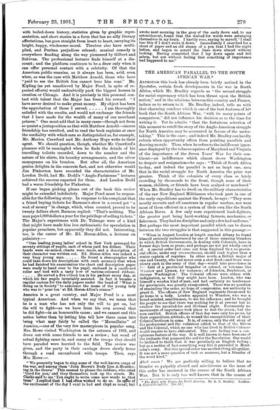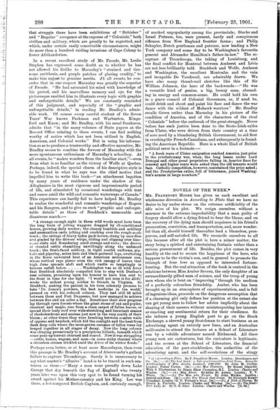THE AMERICAN PARALLEL TO THE SOUTH AFRICAN WAR.*
ALTHOUGH this book has already been briefly noticed in the Spectator, certain fresh developments in the war in South
Africa, which Mr. Bradley regards as "the second struggle for racial supremacy which has been thrust upon the British nation," and in the relations between this country and France, induce us to return to it. Mr. Bradley, indeed, tells us with
that charming candour which is one of the best features of his book that the South African War, "with its many points of
comparison," did not influence his decision as to the time for writing it. Yet he admits "that the fortuitous selection of this moment to retell the story of the Anglo-American struggle
for North America may be accounted in favour of the under- taking." This is the case ; and indeed Mr. Bradley can hardly refrain when opportunity offers from pointing parallels and drawing morals. Thus, when he refers to the indifferent ignor- ance displayed by the tobacco squires of Maryland and Virginia of the importance of the Seven Years' War for their con- tinent—an indifference which almost drove Washington to despair and resignation—he says "Think of South Africa to-day, and indeed the parallel is not an inapt one, save that in the racial struggle for North America the prize was greater. Think of the colonists of every class so lately crowding by thousands to the front, though none of their women, children, or friends have been scalped or murdered." When Mr. Bradley has to dwell on the military characteristics of the raw New England Militiamen who took part in one of the early expeditions against the French, he says "They were mostly recruits and all amateurs in regular warfare, nor were most of them efficient in a system of their own like the South African Boers. A few only were experienced bush-fighters, the greater part being hard-working farmers, mechanics, or fishermen. They had no discipline and only a few had uniforms?' But perhaps the most important parallel which can be drawn between the two struggles is that suggested in this passage:—
" When in August Loudon at length reached Albany he found himself seriously embarrassed by one of those amazing blunders to which British Governments, in dealing with Colonials, have in former days been so prone, and perhaps are not yet wholly cured of. A special order had come out from England that no provin- cial officer, under any circumstances, should rank higher than a senior captain of regulars In other words, a British major of one and twenty, who had never seen a shot fired—and there were plenty such in the army of that day—would take precedence in Ow field of a provincial brigadier or colonel, or veterans like Winslow and Lyman, for instance ; of Johnston, Bradstreet, or George Washington ! The Colonial officers were ablaze with indignation, as well they might have been. Loudon, who was himself a wooden kind of man, and had certainly no tenderness for provincials, was greatly exasperated. There was no question of rescinding the order, no hope of compromise, nor authority to grant iL The officers of New England regiments threatened to go home in a body. Loudon appealed to Winslow, who was a broad-minded, sensible man, to use his influence; and he brought his people to see that there was nothing for it at present but to swallow the uncalled-for and ill-timed slight. Fortunately no movements of importance took place to test the strain ; but the sore rankled. British officers of that day were only too prone, by their supercilious attitude, to wound the susceptibilities of their Colonial brethren in arms. It is, of course, only the old story of the professional and the volunteer added to that of the Briton and the Colonial, which no one who has lived in British Colonies would require to have elaborated. This sore feeling was a con- spicuous feature of the war. It is well, known to have been one of the irritants that prepared the soil for the Revolution. One would he inclined to think that it was peculiarly an English failing ; but as a matter of fact something very like it prevailed in Mont- calm's army. But this special order was another thing altogether. It was not a mere question of tact or manners, but a blunder of the worst kind."
Absit omen! We are perfectly willing to believe that no blunder so palpably absurd and mischievous as the issue of
this order has occurred in the course of the South African War. But it is only too well' known that in the course of
• The Floht with Franda for forth America. By A. G. Brady. Lonaon : A. Constable and Co. [10s.
that struggle there have been exhibitions of " Britisher " and " Regular " arrogance at the expense of "Colonials," both civilian and military, which are greatly to be regretted, and which, under certain easily conceivable circumstances, might do more than a hundred raiding invasions of Cape Colony to foster Afrikanderism.
In a recent excellent study of Mr. Froude, Mr. Leslie Stephen has expressed some doubt as to whether he has not allowed his dislike to Macaulay's "strained and tire- some antithesis, and purple patches of glaring crudity," to make him unjust to genuine merits. At all events, he con- cedes that in one respect Macaulay was greatly the superior of Froude. "He had saturated his mind with knowledge of his period, and his marvellous memory and eye for the picturesque enabled him to illustrate every topic with graphic and unforgettable details." We are constantly reminded of this judgment, and especially of the "graphic and unforgettable details," in reading Mr. Bradley's admir- able work. Of course every careful student of the Seven Years' War knows Parkman and Warburton, Kings- ford and Knox ; and Mr. Bradley, with his usual frankness, admits that "in the many volumes of State papers at the Record Office relating to these events, I can find nothing worthy of notice which has not been utilised in English, American, and Colonial works." But in using his informa- tion so as to produce a trustworthy and effective narrative, Mr. Bradley seems to combine the fervour of Macaulay with the more spontaneous enthusiasm of Macaulay's schoolboy. At all events, he "makes wonders from the familiar start,"—even from what is so familiar as the victory of Wolfe at Quebec. Perhaps, indeed, the special charm of his descriptive style is to be found in what he says was the chief motive that impelled him to write this book—" an attachment begotten by many years of residence under the shadow of the Alleghenies in the most vigorous and impressionable period of life, and stimulated by occasional wanderings with tent and canoe amid the wild and romantic waterways of Canada."
This experience can hardly fail to have helped Mr. Bradley to realise the wonderful and romantic wanderings of Rogers and his Rangers, and to give us such "graphic and unforget- table details" as those of Braddock's memorable and disastrous march
A strange enough sight in these wild woods must have been the long train of jolting waggons dragged by ill-conditioned horses, growing daily weaker; the clumsy tumbrils and artillery and ammunition carts jolting and crashing over the rough-made track ; the strings of heavy-laden pack-horses, stung by aeer-flies and goaded by the drivers' whips, sliding and slipping over lime- Simile slabs and floundering amid stumps and roots ; the droves of stunted cattle shambling unwillingly along the unfenced track ; the fresh-faced soldiery, in tight scarlet uniforms, pig- tails and pipeclay, mitre hats and black-gaitered legs, sweltering in the fierce unwonted heat of an American midsummer sun, whose vertical rays pierce even the rich canopy of leaves that high June spreads aloft and which rustle so temptingly in breezes unfelt below Washington was so ill with fever that Braddock absolutely compelled him to stay with Dunbar's rear column, promising upon his honour to have him sent to the front in time for the fight. I would not miss it for 1.500,' wrote the ardent young soldier to friends in Virginia. So Braddock, making the patient in his turn solemnly promise to take Dr. James's powders, the best medicine in the world,' pressed on with his reduced column. They had still 92 miles between them and Fort Duquesne, but now managed to achieve between five and six miles a day. Sometimes their slow progress lay through open forests where the giant stems of oak and poplar, chestnut and maple, rose from a clean carpet of fallen leaves, or spread their leafy roof over wide-stretching and luxuriant masses of rhododendrons and azaleas just now in the very zenith of their bloom ; at other times they were brushing between sombre walls of cypress and hemlock, which hid the sunlight and the beat from dank deep soils where the moss-grown carcases of fallen trees lay heaped together in all stages of decay. Now the long column was clinging precariously to a precipitous hillside, beneath which some pent-up torrent churned and roared. Now it was struggling —cattle, horses, wagons, and men—in some rocky channel where a shrunken stream trickled amid the debris of ite winter floods."
Perhaps even better, or at least more Maxaulayan, than even
this passage is Mr. Bradley's account of Abereromby's gallant failure to capture Ticonderoga. Surely it is unnecessary to say what master's " allusive " hand is to be traced in such sen- tences as these :—" Many a man went proudly down Lake George that day beneath the flag of England who twenty years later was upon this very spot to be found turning his sword against his Mother-country and his King, Lee was there, a hot-tempered British Captain, and, curiously enough, of marked unpopularity among the provincials ; Starke and Israel Putnam, too, were present, hardy and conspicuous riflemen from New England frontier farms ; and Philip Schuyler, Dutch gentleman and patroon, now leading a New York company and some day to be Washington's favourite general and Alexander Hamilton's father-in-law." The re- capture of Ticonderoga, the taking of Louisburg, and the final conflict for Montreal between Amherst and Levis are not less brilliantly told. Braddock and Wolfe, Amherst and Washington, the excellent Montealm and the vain and incapable De Vaudreuil, are admirably drawn. We have also many thumb-nail sketches like this of Sir William Johnson, the hero of the backwoods :—" He was a versatile kind of genius, a big, breezy man, abound- ing in energy and common-sense. He could hold his own in a grave council of Colonial Governors, or, if need be, could drink and shout and paint his face and dance the war dance with the wildest of Mohawk warriors." Mr. Bradley recalls Green rather than Macaulay in his picture of the condition of America, and of the characters of the rival " Colonials" before the outbreak of the great struggle. Never before has such justice been done to the Scoto-Irish exiles from Ulster, who were driven from their country at a time of sore need by a blundering British Government, to aid first in crushing the French-Canadians, and subsequently in found- ing the American Republic. Here is a whole Iliad of British political error in a footnote ;—
" A fresh wave of Ulster emigration reached America just prior to the revolutionary war, when, the long leases under Lord Donegal and other great proprietors falling in, heavier fines for renewal and higher rents were asked than the old tenants would face. Catholic competition, however, maintained the price asked; and the Presbyterian exiles, full of bitterness, joined Washing- ton's armies in large numbers."







































 Previous page
Previous page